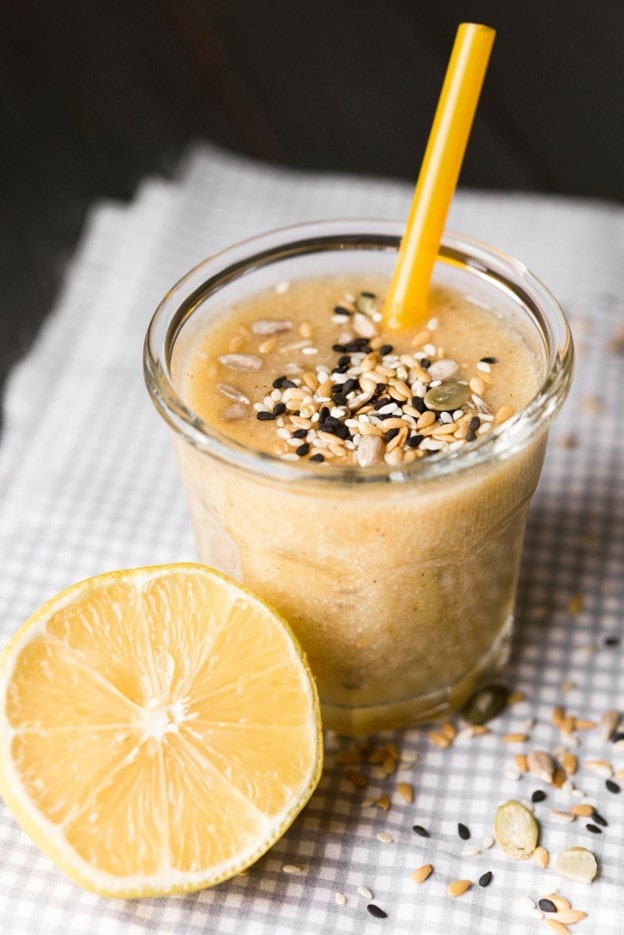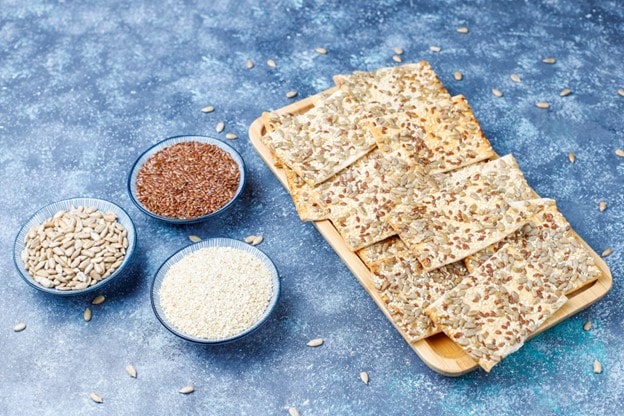Last updated on December 13th, 2024 at 05:20 pm

Flaxseed, also known as linseed or “jawas seeds” in many regions, is a tiny powerhouse packed with nutrients. These seeds have been used for centuries due to their exceptional health benefits, versatility, and ease of incorporation into daily diets.
What is Flaxseed ?
Flaxseed comes from the flax plant (Linum usitatissimum), a blue-flowered crop that has been cultivated since ancient times. These small, brown or golden seeds are rich in omega-3 fatty acids, lignans (plant compounds with antioxidant properties), and dietary fiber. Their nutritional profile makes them a go-to superfood for people seeking to improve their health naturally.
Flaxseed Benefits
Heart Health
Flaxseeds are abundant in alpha-linolenic acid (ALA), a type of omega-3 fatty acid that supports heart health. Consuming flaxseeds regularly can help reduce bad cholesterol levels (LDL) and lower blood pressure, decreasing the risk of cardiovascular disease.
Digestive Health
Rich in soluble and insoluble fiber, flaxseeds promote healthy digestion and prevent constipation. The fiber content supports gut bacteria, improving overall gut health.
Weight Management
Flaxseeds are ideal for weight loss due to their high fiber and healthy fat content, which keep you feeling full longer. Learn how to eat flax seeds for weight loss by adding them to smoothies, salads, or oatmeal.
Hormonal Balance
The lignans in flaxseeds have estrogen-like properties, making them beneficial for balancing hormones, particularly during menopause.
Flaxseed Benefits for Skin
Flaxseed, a small yet mighty superfood, is a treasure trove of nutrients that can transform your skincare routine. Packed with omega-3 fatty acids, lignans, antioxidants, and essential vitamins, flaxseeds nourish the skin from within and can also be used topically for radiant, healthy skin. Here’s a detailed look at how flaxseed benefits the skin and why they deserve a place in your beauty regimen.
1. Deep Hydration and Moisture Retention
Flaxseeds are rich in omega-3 fatty acids, which are essential for maintaining the skin’s natural lipid barrier. This barrier locks in moisture and keeps the skin hydrated, soft, and supple. Regular consumption of flaxseeds helps combat dryness and prevents flaky or scaly skin. Additionally, applying flaxseed gel topically can provide an instant boost of hydration.
How to Use :
- Mix 1 tablespoon of ground flaxseed into smoothies or oatmeal to hydrate the skin from within.
- Apply homemade flaxseed gel as a facial mask for immediate hydration.
2. Reduces Fine Lines and Wrinkles
The antioxidants in flaxseeds fight free radicals, which are responsible for premature aging. Flaxseeds are also a source of lignans, plant compounds with estrogen-like effects that improve skin elasticity and reduce the appearance of fine lines and wrinkles. Incorporating flaxseeds into your diet can help slow the signs of aging while promoting a youthful glow.
DIY Flaxseed Anti-Aging Mask :
- Boil 1 tablespoon of flaxseeds in 2 cups of water until it forms a gel-like consistency.
- Strain and let the gel cool.
- Apply the gel to your face, leave it on for 20 minutes, and rinse with lukewarm water.
3. Soothes Inflammation and Redness
Flaxseeds possess anti-inflammatory properties that are particularly beneficial for people with sensitive or irritated skin. They can help calm redness, swelling, and skin conditions such as eczema, rosacea, or psoriasis. The omega-3s in flaxseeds play a key role in reducing skin inflammation and improving overall skin health.
How to Use :
- Consume 1-2 tablespoons of ground flaxseed daily to reduce inflammation.
- Apply flaxseed oil to irritated areas for a soothing effect.
4. Prevents Acne and Breakouts
Flaxseeds help regulate sebum production due to their high content of essential fatty acids, preventing clogged pores and breakouts. They also have a cleansing effect on the body, aiding in the elimination of toxins that can cause acne. Furthermore, the anti-inflammatory properties of flaxseeds reduce the redness and swelling associated with acne.
Flaxseed Acne Spot Treatment :
- Mix flaxseed powder with honey to create a thick paste.
- Apply the paste to acne-prone areas.
- Leave it on for 15-20 minutes before rinsing off with cool water.
5. Promotes Even Skin Tone
Regular consumption of flaxseeds can improve blood circulation, thus bringing oxygen and nutrients to the skin. This enhanced circulation fades dark spots, pigmentation, and uneven skin tone over time. The lignans in flaxseeds also increase collagen production, which repairs damaged skin and brings a smoother complexion.
How to Use :
- Mix ground flaxseed into your diet through smoothies, cereals, or baked goods.
- Apply flaxseed gel as a natural toner to brighten your skin.

6. Detoxifies and Protects Against Environmental Damage
Flaxseeds are rich in antioxidants, particularly vitamin E, that protect the skin from UV radiation and environmental pollution. Vitamin E acts as an antioxidant that neutralizes free radicals, decreases oxidative stress, and protects the skin from damage-causing dullness and premature aging.
Flaxseed Detox Water Recipe :
- Add 1 tablespoon of whole flaxseeds to a glass of water.
- Let it sit overnight and drink it first thing in the morning.
7. Heals and Repairs Damaged Skin
Flaxseeds are an excellent source of nutrients like zinc, magnesium, and B vitamins, all of which are essential for skin repair. They help heal wounds, reduce scarring, and regenerate skin cells, making your skin look fresher and healthier.
Flaxseed Healing Gel :
- Prepare flaxseed gel and store it in the refrigerator.
- Apply the gel to cuts, burns, or scars to speed up the healing process.
Flaxseed Benefits for Hair
Flaxseeds offer incredible benefits for hair health due to their nutrient-dense profile.
Flaxseed for Hair Growth
The omega-3 fatty acids in flaxseeds nourish hair follicles, promoting healthy hair growth. Vitamin E, also present in flaxseeds, strengthens the hair shaft, reducing breakage.
Improves Scalp Health
Flaxseed gel can be applied directly to the scalp to reduce dryness, inflammation, and dandruff, creating an optimal environment for hair growth.
Adds Shine and Reduces Frizz
Using flaxseed oil or gel on your hair can leave it smooth, shiny, and frizz-free, making it a natural alternative to chemical-laden products.
Flaxseed in Pregnancy
Pregnant women can benefit from flaxseeds due to their high content of omega-3 fatty acids and fiber. Omega-3s support fetal brain development, while fiber helps prevent constipation, a common pregnancy concern. However, due to their estrogen-like effects, it’s crucial to consult a healthcare provider to ensure safe consumption during pregnancy.
How to Eat Flax Seeds
Incorporating flaxseeds into your diet is simple. Here are a few tips:
- Ground Flaxseeds vs. Whole Seeds
While whole flaxseeds are nutritious, grinding them allows for better nutrient absorption. Use a coffee grinder or purchase pre-ground flaxseed.
- Add to Breakfast
Sprinkle ground flaxseeds on yogurt, oatmeal, or smoothies for a nutritional boost.
- Baking
Replace eggs in baking recipes with flaxseed: mix one tablespoon of ground flaxseed with three tablespoons of water and let it sit for a gel-like consistency.
- Weight Loss
To use flaxseeds for weight loss, consume them with water or mix them into meals that are high in protein to promote satiety and curb cravings.
Recipes with Flaxseeds
- Flaxseed Smoothie
Blend 1 tablespoon of ground flaxseed with a banana, almond milk, and a handful of berries for a delicious and healthy drink.
- Flaxseed Crackers
Mix ground flaxseeds with water, herbs, and spices. Spread the mixture thinly on a baking sheet and bake until crisp.
- Flaxseed Pudding
Combine 2 tablespoons of ground flaxseeds with a cup of almond milk, sweeten with honey, and refrigerate overnight for a creamy, nutrient-packed pudding.

Conclusion
Flaxseed is a versatile, nutrient-rich food that can enhance your diet in numerous ways. From promoting heart health and aiding weight loss to improving skin and hair, its benefits are endless. Whether you’re consuming jawas seeds in their raw form or incorporating them into recipes, the possibilities are vast. Embrace flaxseeds and unlock the full potential of this ancient superfood!
FAQs on The Ultimate Flaxseed Guide: Benefits, Uses, and Recipes
1. What are the main flaxseed benefits?
Flaxseeds are packed with omega-3 fatty acids, fiber, and antioxidants, making them excellent for heart health, digestion, and hormonal balance. They help lower cholesterol, manage weight, and improve skin and hair health. Additionally, their lignans provide powerful anti-inflammatory and anti-cancer properties, promoting overall well-being.
2. How can I incorporate flaxseeds into my diet?
Flaxseeds can be added to smoothies, oatmeal, salads, or baked goods. For better absorption, grind the seeds before use or buy pre-ground flaxseed. You can also consume them as flaxseed oil or mix them with water to replace eggs in recipes, offering a simple way to boost nutrition.
3. How to eat flax seeds for weight loss?
To aid weight loss, consume 1-2 tablespoons of ground flaxseeds daily. Mix them into smoothies, oatmeal, or yogurt, or drink with water for a fiber boost. Their high fiber content keeps you feeling full, reducing hunger and preventing overeating. Avoid heating flaxseeds excessively, as it may reduce their nutritional value.
4. Can flaxseeds improve skin and hair health?
Flaxseeds are rich in omega-3 fatty acids and antioxidants, which hydrate the skin, reduce wrinkles, and combat acne. For hair, they promote growth, reduce frizz, and improve scalp health. Use them in your diet or apply flaxseed gel topically for glowing skin and shiny, healthy hair.
Related Links :
How to eat Chia seeds ?
Best High Protein Foods for Muscle Growth
Stress Management for High Blood Pressure
Which food is best for pregnancy ?
Indian Pregnancy Diet Plan For Women
